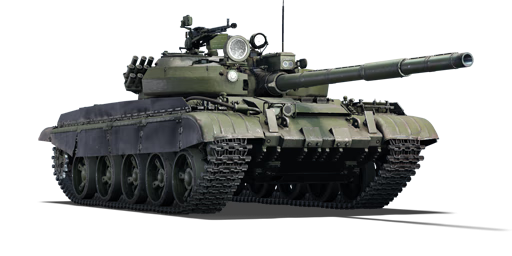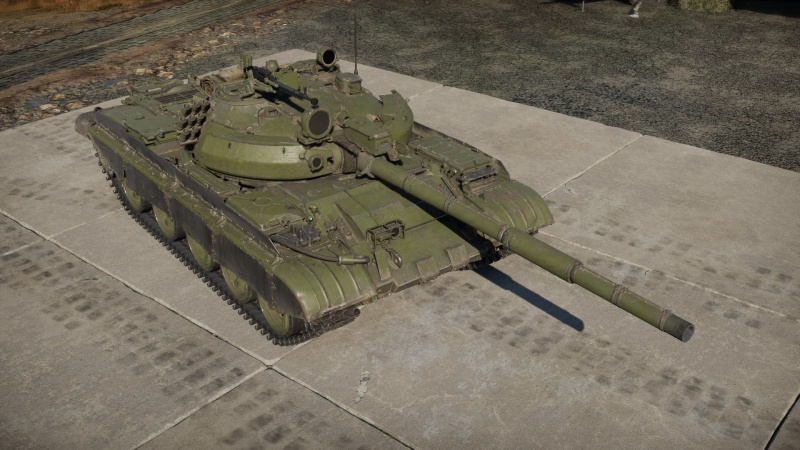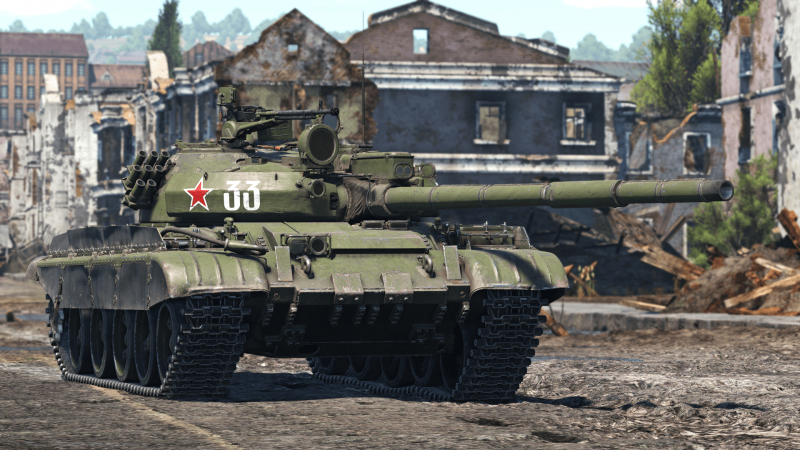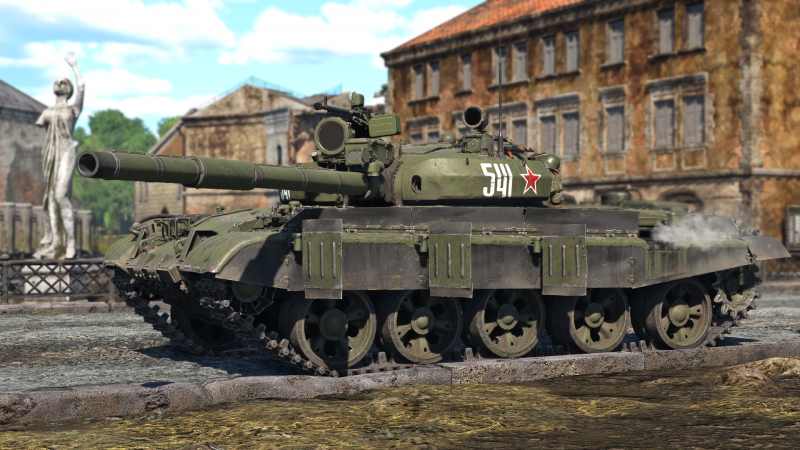Difference between revisions of "T-62M-1"
Colok76286 (talk | contribs) (→Media: Added video) |
m (→Ammunition) (Tag: Visual edit) |
||
| Line 31: | Line 31: | ||
'''Armour type:''' | '''Armour type:''' | ||
| + | |||
* Rolled homogeneous armour (hull) | * Rolled homogeneous armour (hull) | ||
* Cast homogeneous armour (turret, cupola) | * Cast homogeneous armour (turret, cupola) | ||
| Line 45: | Line 46: | ||
'''Notes:''' | '''Notes:''' | ||
| + | |||
* Suspension wheels and tracks are 20 mm thick, while torsion bars are 10 mm thick. | * Suspension wheels and tracks are 20 mm thick, while torsion bars are 10 mm thick. | ||
* Belly armour is 20 mm thick. | * Belly armour is 20 mm thick. | ||
| Line 93: | Line 95: | ||
==== Ammunition ==== | ==== Ammunition ==== | ||
| + | |||
* The stock 3BK15M HEATFS has high penetration for its class, but its 500 mm of flat penetration while overkill against steel armour, is less effective versus reactive or composite armour, and deals less post-penetration damage than the APFSDS rounds. | * The stock 3BK15M HEATFS has high penetration for its class, but its 500 mm of flat penetration while overkill against steel armour, is less effective versus reactive or composite armour, and deals less post-penetration damage than the APFSDS rounds. | ||
* The 3OF27 HE shell is surprisingly strong and can be lethal against even MBTs; however, it is not as powerful as the 125 mm HE rounds used by top-tier Soviet and Chinese MBTs and needs fine aim for best results. Considering the tank's long reload time, the HE shell is a situational choice. | * The 3OF27 HE shell is surprisingly strong and can be lethal against even MBTs; however, it is not as powerful as the 125 mm HE rounds used by top-tier Soviet and Chinese MBTs and needs fine aim for best results. Considering the tank's long reload time, the HE shell is a situational choice. | ||
| − | * The 9M117 gun-launched ATGM has 600 mm of penetration and is mouse-guided. It is the most versatile of the chemical rounds since it can be used against helicopters, can cause | + | * The 9M117 gun-launched ATGM has 600 mm of penetration and is mouse-guided. It is the most versatile of the chemical rounds since it can be used against helicopters, can cause Overpressure on lightly armored and open-topped vehicles, and has the highest penetration. Taking a few into battle is a good idea. |
* The 3BM21 APFSDS far exceeds any of the APFSDS rounds available to the original T-62. | * The 3BM21 APFSDS far exceeds any of the APFSDS rounds available to the original T-62. | ||
* The 3BM28 APFSDS significantly improves on the angled penetrative performance of 3BM21, at the expense of lower flat penetration. | * The 3BM28 APFSDS significantly improves on the angled penetrative performance of 3BM21, at the expense of lower flat penetration. | ||
| Line 264: | Line 267: | ||
;Skins | ;Skins | ||
| + | |||
* [https://live.warthunder.com/feed/camouflages/?vehicle=ussr_t_62m1 Skins and camouflages for the {{PAGENAME}} from live.warthunder.com.] | * [https://live.warthunder.com/feed/camouflages/?vehicle=ussr_t_62m1 Skins and camouflages for the {{PAGENAME}} from live.warthunder.com.] | ||
| Line 275: | Line 279: | ||
;Other vehicles of similar configuration and role | ;Other vehicles of similar configuration and role | ||
| + | |||
* [[T-54/55 (Family)]] | * [[T-54/55 (Family)]] | ||
Revision as of 08:33, 12 June 2022
| This page is about the Soviet medium tank T-62M-1. For other versions, see T-62 (Family). |
Contents
Description
The T-62M-1 is a rank VI Soviet medium tank with a battle rating of 9.0 (AB/RB/SB). It was introduced in Update 1.79 "Project X".
A modernized version of the famous T-62, the T-62M-1 chiefly features improved firepower, fire control, and protection in a similar manner to the T-55AM-1. The hull and turret feature add-on composite armour, including the conspicuous "brow" arrays on the turret cheeks. The gun is now equipped with a thermal sleeve and can fire improved APFSDS, HEAT-FS and HE shells in addition to a potent ATGM. A laser rangefinder is mounted in a large box above the gun barrel, smoke grenade launchers are added to the turret side, and a more powerful engine has been installed to compensate for the increased weight of all these new features. Though the T-62M-1's gun handling and speed are still inferior to most of its competitors, it has many tools at its disposal and can be a formidable opponent despite its old chassis and somewhat crude nature.
General info
Survivability and armour
The T-62M-1 has very similar armour to the T-55AM-1, having similar composite add-on armour. The turret cheeks are protected by large curved composite blocks, sometimes historically referred to as "Brezhnev's Eyebrows" due to their appearance. These mean the turret can withstand many kinetic rounds, including any APFSDS that has less than 400 mm of penetration. The protection against chemical munitions is even greater, able to stop between 450-750 mm of chemical penetration depending on the angle. The brow armour's composite covers less than it might seem; the sectors closer to the gun are not backed by metal-polymer layers and only the outer steel provides extra protection. It can help to point the turret slightly away from opponents to reduce the chances of getting hit in the non-composite zones.
The hull protection is less, although still relevant. The hull composite will stop APDS and HEAT rounds from the L7 105 mm gun, but any more powerful rounds will penetrate. The hull sides are relatively well protected. 80 mm RHA will stop most autocannon rounds, and the composite skirts as well as flaps can stop HEAT rounds at an angle.
Frontal weak points include the cannon breech area, as it is not covered by the add-on composite. Additionally the lower front plate is not protected by composite. These areas are easy to penetrate. The hull sides also are only 20 mm near the bottom, which is a weakness that can be exploited by autocannons. That said, there is essentially nothing important in those areas. The rear armour is not worth mentioning, as it will not stop anything larger than a heavy machine gun.
Side flaps similar to those used on the T-64A (1971) can be equipped on the T-62M-1 with an unlockable modification. They add 30 kg of mass to the tank, which is a negligible penalty, and help to block HEAT-FS projectiles and ATGMs from side-aspect shots. Each flap will fall off after being hit, so do not count on being able to body-block an entire barrage of chemical rounds.
The T-62M-1 also has wet ammunition storage bins. 16 rounds are placed within the fuel tank located beside the driver, acting as a spaced armour, protecting the ammunition from HEAT. Successive HEAT shots might still detonate the ammunition. Note that APFSDS can detonate the rounds with ease, so avoid being shot in the hull if possible.
Armour type:
- Rolled homogeneous armour (hull)
- Cast homogeneous armour (turret, cupola)
| Armour | Front (Slope angle) | Sides | Rear | Roof |
|---|---|---|---|---|
| Hull | 100+30 mm (59°) Upper glacis 100 mm (55°) Lower glacis |
80+8 mm Top 80 mm (spherical) + 8 mm Turret ring bulge 20 mm (28°) Bottom |
45 mm (2°) Upper plate 20 mm (cylindrical) Lower glacis |
30 mm (0-3°) 12 mm Mudguards |
| Turret | 214-240 mm (spherical) + 65-85 (spherical) Turret cheeks 40-50 mm (0-63°) Gun mantlet |
115-196 mm (spherical) | 65 mm (spherical) | 60 mm (74-78°) Front 30 mm (78-85°) Centre 60 mm (29-67°) Rear |
Notes:
- Suspension wheels and tracks are 20 mm thick, while torsion bars are 10 mm thick.
- Belly armour is 20 mm thick.
- Commander cupola is 40 mm thick.
- Composite armour is present on the front glacis and turret front:
| Composite armour | Front |
|---|---|
| Hull | Upper glacis ~300 mm Kinetic ~450 mm Chemical |
| Turret | Turret cheeks ~400 mm Kinetic 450-750 mm Chemical |
Mobility
| Game Mode | Max Speed (km/h) | Weight (tons) | Engine power (horsepower) | Power-to-weight ratio (hp/ton) | ||||
|---|---|---|---|---|---|---|---|---|
| Forward | Reverse | Stock | AoA | Stock | Upgraded | Stock | Upgraded | |
| Arcade | 57 | 9 | 41.9 | 0.03 | 1,069 | 1,316 | 25.47 | 31.33 |
| Realistic | 51 | 8 | 610 | 690 | 14.53 | 16.43 | ||
Modifications and economy
Armaments
Main armament
| 115 mm U-5TS | Turret rotation speed (°/s) | Reloading rate (seconds) | |||||||||||
|---|---|---|---|---|---|---|---|---|---|---|---|---|---|
| Mode | Capacity | Vertical | Horizontal | Stabilizer | Stock | Upgraded | Full | Expert | Aced | Stock | Full | Expert | Aced |
| Arcade | 42 | -5°/+16° | ±180° | Two-plane | 14.3 | 19.8 | 24.0 | 26.5 | 28.2 | 11.96 | 10.58 | 9.75 | 9.20 |
| Realistic | 8.9 | 10.5 | 12.8 | 14.1 | 15.0 | ||||||||
Ammunition
- The stock 3BK15M HEATFS has high penetration for its class, but its 500 mm of flat penetration while overkill against steel armour, is less effective versus reactive or composite armour, and deals less post-penetration damage than the APFSDS rounds.
- The 3OF27 HE shell is surprisingly strong and can be lethal against even MBTs; however, it is not as powerful as the 125 mm HE rounds used by top-tier Soviet and Chinese MBTs and needs fine aim for best results. Considering the tank's long reload time, the HE shell is a situational choice.
- The 9M117 gun-launched ATGM has 600 mm of penetration and is mouse-guided. It is the most versatile of the chemical rounds since it can be used against helicopters, can cause Overpressure on lightly armored and open-topped vehicles, and has the highest penetration. Taking a few into battle is a good idea.
- The 3BM21 APFSDS far exceeds any of the APFSDS rounds available to the original T-62.
- The 3BM28 APFSDS significantly improves on the angled penetrative performance of 3BM21, at the expense of lower flat penetration.
APFSDS rounds should be the primary ammo choice for the T-62M-1, but its selection of three types of chemical rounds should not be overlooked either.
| Penetration statistics | |||||||
|---|---|---|---|---|---|---|---|
| Ammunition | Type of warhead |
Penetration @ 0° Angle of Attack (mm) | |||||
| 10 m | 100 m | 500 m | 1,000 m | 1,500 m | 2,000 m | ||
| 3BK15M | HEATFS | 500 | 500 | 500 | 500 | 500 | 500 |
| 3OF27 | HE | 40 | 40 | 40 | 40 | 40 | 40 |
| 9M117 | ATGM | 600 | 600 | 600 | 600 | 600 | 600 |
| 3BM21 | APFSDS | 420 | 415 | 405 | 390 | 380 | 370 |
| 3BM28 | APFSDS | 386 | 384 | 377 | 369 | 361 | 352 |
| Shell details | |||||||||
|---|---|---|---|---|---|---|---|---|---|
| Ammunition | Type of warhead |
Velocity (m/s) |
Projectile Mass (kg) |
Fuse delay (m) |
Fuse sensitivity (mm) |
Explosive Mass (TNT equivalent) (g) |
Ricochet | ||
| 0% | 50% | 100% | |||||||
| 3BK15M | HEATFS | 1,060 | 12.2 | 0.05 | 0.1 | 2,280 | 65° | 72° | 77° |
| 3OF27 | HE | 800 | 17.82 | 0 | 0.1 | 4,820 | 79° | 80° | 81° |
| 3BM21 | APFSDS | 1,600 | 4.55 | N/A | N/A | N/A | 76° | 77° | 80° |
| 3BM28 | APFSDS | 1,600 | 4.88 | N/A | N/A | N/A | 78° | 80° | 81° |
| Shell details | ||||||||||
|---|---|---|---|---|---|---|---|---|---|---|
| Ammunition | Type of warhead |
Velocity (m/s) |
Range (m) |
Projectile Mass (kg) |
Fuse delay (m) |
Fuse sensitivity (mm) |
Explosive Mass (TNT equivalent) (g) |
Ricochet | ||
| 0% | 50% | 100% | ||||||||
| 9M117 | ATGM | 370 | 5,000 | 18.8 | 0.05 | 0.1 | 4,620 | 80° | 82° | 90° |
Ammo racks
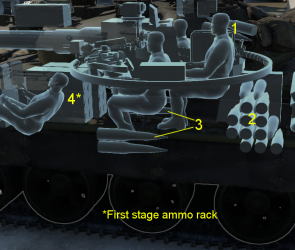
| Full ammo |
1st rack empty |
2nd rack empty |
3rd rack empty |
4th rack empty |
Visual discrepancy |
|---|---|---|---|---|---|
| 42 | 41 (+1) | 21 (+21) | 17 (+25) | 1 (+41) | No |
Notes:
- Shells are modeled individually and disappear after having been shot or loaded.
- Rack 4 is a first stage ammo rack. It totals 16 shells and gets filled first when loading up the tank.
- This rack is also emptied early: the rack depletion order at full capacity is: 4 - 1 - 2 - 3.
- Simply not firing when the gun is loaded will move ammo from racks 1-3 into rack 4. Firing will interrupt the restocking of the ready racks.
- If you pack 17 (+25) shells, it will fill only the frontal wet stowage ready rack.
Machine guns
| 12.7 mm DShK | ||||
|---|---|---|---|---|
| Mount | Capacity (Belt) | Fire rate | Vertical | Horizontal |
| Pintle | 300 (50) | 600 | -10°/+60° | ±180° |
| 7.62 mm PKT | ||||
|---|---|---|---|---|
| Mount | Capacity (Belt) | Fire rate | Vertical | Horizontal |
| Coaxial | 3,000 (250) | 700 | N/A | N/A |
Usage in battles
The T-62M-1 should be played like other high tier Soviet MBTs, though with an higher emphasis on range and cover. Hide your hull and use your almost impenetrable turret armour to deflect hostile fire. If possible, try to use cover to conceal your cannon breech, as a well-placed APFSDS can disable your cannon and, depending on which side of tank you were hit from, kill your gunner or loader. A turret penetration may result in a one-shot kill if it hits your ammo. Do not allow yourself to fall into close-range combat areas if at all possible.
Those who have fought and/or used the T-55AM-1 will find the same tactics and assumptions work against the T-62M-1, as well. It performs similarly, mostly just having upgraded the strengths the T-55AM-1 is known for; the turret armour is even better, and the power of the variety of rounds these tanks are known for has been increased, thanks to the increased calibre of the cannon (from 100 mm on the T-55AM-1 to 115 mm on the T-62M-1). This allows the T-62M-1 to have ways of dealing with vehicles all the way up to 9.7.
Thanks to the incredible turret armour, and highly effective and varied ammunition choices, the T-62M-1 is highly suited for a long-range sniping and support role. Players of tanks such as the Chieftain will have an idea of the playstyle. Use your fast and powerful APFSDS rounds to quickly disable targets travelling quickly at ranges out to several kilometres, use your potent HEAT-FS to dispatch targets at closer ranges, or fire the breech-loaded ATGM for highly accurate shots against exposed targets, both ground and air (especially against helicopters).
Try to avoid close-range engagements at all costs. The T-62M-1 suffers in almost all regards compared to other tanks at closer ranges. Compared to other common tanks, such as the XM-1 (GM), the T-62M-1 has a far longer reload, worse acceleration and top speed, a larger and slower turning circle, and a poorer turret traverse speed. If you get caught out, try to take quick shots to disable the mobility of enemy tanks if you cannot out-right kill them, and make your goal of upmost importance to leave the area immediately. Use your smoke launchers to hide your retreat, and cover your upper frontal plate at all costs; a penetration on the left side of your front plate will spell instant death.
Beware of fast MBTs like the Leopard A1A1, as their mobility allows them to easily flank you and get a shot into your weaker side armour. The T-62M-1 is currently unlikely to face many tanks capable of penetrating its turret composite armour. The majority of deaths will likely result from being shot through weak spots or from flanking, so avoiding these should be your primary concern.
Your tank also has a large amount of weak-spots from even the slightest angle above you, so make sure you take enemy helicopters seriously and deal with them as fast as possible. Your gun elevation isn't the greatest, so make sure you use terrain to help lift your gun as well as present thicker armour profiles.
Fighting the T-62M-1
The T-62M-1's core strengths lie in the frontal armour and versatile ammunition choices. Do not attempt to out-snipe a T-62M-1 in anything short of a hull-down British MBT. Instead, abuse the T-62M-1's inferior mobility to out-flank it and quickly disable the gun. At closer ranges with higher penetration shells (260+ mm penetration, chemical or kinetic), shooting the cannon breech can also serve to turn the T-62M-1 into an easy kill.
If you're engaging a wary T-62M-1 at closer ranges, try to bait out a shot or wait until he fires. The T-62M-1, depending on crew skills, has a reload of up to 12 seconds, giving a smart opponent plenty of time to take out a T-62M-1 after he fires. Using smoke to hide a quick change in your position can also work well, as both the T-62M-1 itself and its turret turn slowly compared to vehicles it will face, giving you time to drive around it in the confusion.
Pros and cons
Pros:
- Varied selection of shells - APFSDS, HEAT-FS, high explosive, and a barrel-launched ATGM for long ranges or dealing with helicopters.
- Laser rangefinder and high-velocity ammunition allow long-range engagements.
- Tough turret cheek armour for the battle rating, as well as a composite armour add-on on the glacis.
- Wet ammunition storage within the frontal fuel tank holds the ready ammunition, reducing vulnerability to HEAT rounds.
- Four crew members, compared to three on most Soviet MBTs, increase its survivability on the battlefield.
- Frontal composite armour makes the front immune to 105 mm APDS and HEATFS.
- Researchable armour package adds panels to the side of the tank which reduce the impact of HEAT-FS rounds.
- Anti-tank guided missile can be fired on the move.
Cons:
- Frontal composite armour is not resistant to common APFSDS shells and HEAT-FS shells larger than 105 mm.
- Not very mobile, no neutral steering.
- No thermal sights.
- Substandard gun handling: mediocre traverse speed.
- Three crew members lined-up on the right side of the tank, one shot may knock them out.
- Weak gun mantlet, leaving cannon breech highly exposed at closer ranges.
- Very long reload time compared to most contemporaries leaving you unable to deliver quick follow-up shots.
History
By the early 80s, the USSR began deploying new tanks: the T-72s, the modernized versions of the T-64, and its derivatives, the T-80s. However, the country also had a rather large fleet of "old-school" models that were no longer a match for the newest tanks but still possessed some modernization potential. So, in 1981 the government approved a project on the complex modernization of the T-62s. The aim of the project was to upgrade the defenses and augment the tanks' firepower. Following several radical design changes, the tank's combat effectiveness – despite the resurfaced issues and substantial age of the model – was significantly increased, putting the modified T-62M-1 on the same level as the third-generation tanks.
- From Devblog
Media
- Skins
- Videos
See also
- Other vehicles of similar configuration and role
External links
| USSR medium tanks | |
|---|---|
| T-28 | T-28 (1938) · T-28 · T-28E |
| T-34-76 | T-34 (Prototype) · T-34 (1940) · T-34 (1941) · T-34 (1st Gv.T.Br.) · T-34 (1942) · T-34E STZ · T-34E |
| T-34-57 | T-34-57 · T-34-57 (1943) |
| T-34-85 | T-34-85 (D-5T) · T-34-85 · T-34-85E |
| T-34-100 | T-34-100 |
| T-44 | T-44 · T-44-100 · T-44-122 |
| T-54 | T-54 (1947) · T-54 (1949) · T-54 (1951) |
| T-55 | TO-55 · T-55A · T-55AM-1 · T-55AMD-1 |
| T-62 | T-62 · T-62M-1 |
| T-64 | Object 435 · T-64A (1971) · T-64B |
| T-72 | T-72A · T-72AV (TURMS-T) · T-72B · T-72B (1989) · T-72B3 · T-72M2 Moderna |
| T-80 | T-80B · T-80U · T-80UD · T-80UK · T-80UM2 · Т-80U-Е1 · T-80BVM · Object 292 |
| T-90 | Т-90А · T-90M |
| Trophies/Lend-Lease | |
| Germany | ▂T-III · ▂T-V |
| Great Britain | ▂МК-IX "Valentine" |
| USA | ▂M3 Medium · ▂M4A2 |


